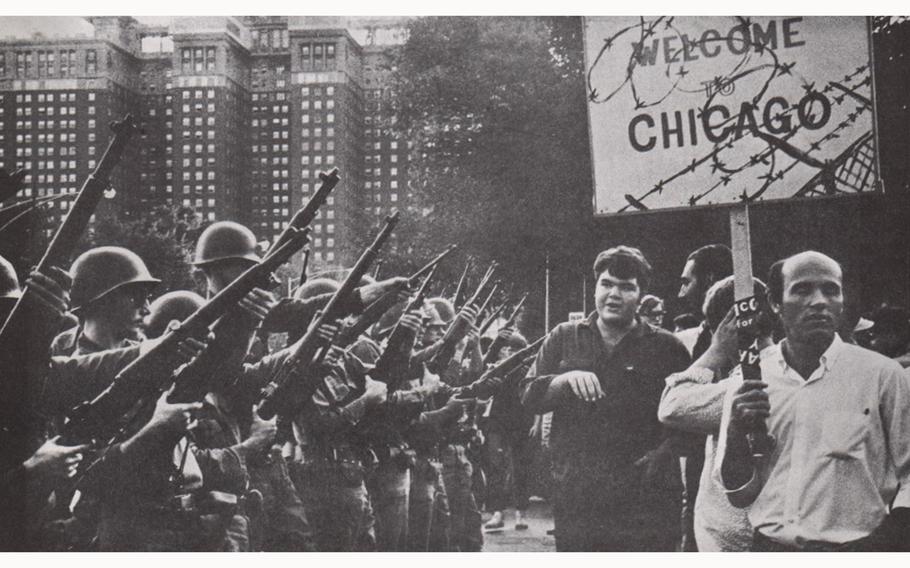
National Guard members and demonstrators are seen at the 1968 Chicago Democratic Convention. (WikiMedia Commons/Fred Mason/ Liberation News Service)
Fifty-six years ago, divided Democrats braved raging street protests against the Vietnam War to hold their 1968 convention in Chicago.
The party gathers this week for the Democratic National Convention in the same city with anger simmering over another far-away war, this time in Gaza. But leaders hope to avoid the images of chaos and violence on the streets outside that derailed their chances of winning the White House in 1968.
Pro-Palestinian protesters are vowing to fill the streets of the Windy City with loud demonstrations of up to 25,000 people expected to demand a ceasefire in Gaza and an end to U.S. military support for Israel.
With peace talks stalled, progressive demonstrators are livid at President Biden for failing to stop the war, which has dragged on for 10 months since the Oct. 7 Hamas terror attack, or at least rein in the aggressive military stance of Israeli Prime Minister Benjamin Netanyahu.
In some ways, the tumult mirrors the scene in ’68, when an unpopular President Lyndon Johnson, who oversaw the escalation of the war in Vietnam, abandoned his reelection bid and Vice President Hubert Humphrey was vying to take over the mantle ahead of a fall election against Republican Richard Nixon.
But there are major differences which may limit the peril for Team Blue.
Kamala Harris has largely unified Democrats in just a few weeks after President Biden stepped aside and handed her the baton. The party is remarkably unified behind what many see as an existential battle to defeat former President Donald Trump.
That’s a big difference from Humphrey, who faced widespread opposition within the party over his support for the war in Vietnam, which was also a much more serious issue than Gaza because American soldiers were fighting and dying on the battlefield.
Humphrey was also grappling with rifts between the Democrats working-class base and youthful leftist protesters, as well as deep splits over the civil rights movement.
Harris, on the other hand, says she shares protesters’ concerns about the war in Gaza and has sought to carve out a bit of distance between herself and Biden even as she mostly stands by his side.
The presumptive presidential nominee has vowed to meet with members of the so-called “uncommitted” movement of pro-Palestinian Democrats who won slots as delegates on a platform of protest against Biden’s handling of the war, although she has balked at their demand for talks over cutting arms to Israel.
Harris has already gotten a taste of pro-Palestinian protests as she held a round of successful rallies with her vice-presidential running mate Tim Walz.
She silenced a heckler who interrupted her sprawling rally in Detroit: “If you want Trump to win, say that. Otherwise I’m speaking.” But she took a more sympathetic tack in Phoenix the next day.
“The president and I are working around the clock every day to get that ceasefire deal done and bring the hostages home,” she said. “I respect your voices, but we are here to now talk about the race in 2024.”
©2024 New York Daily News.
Visit nydailynews.com
Distributed by Tribune Content Agency, LLC.